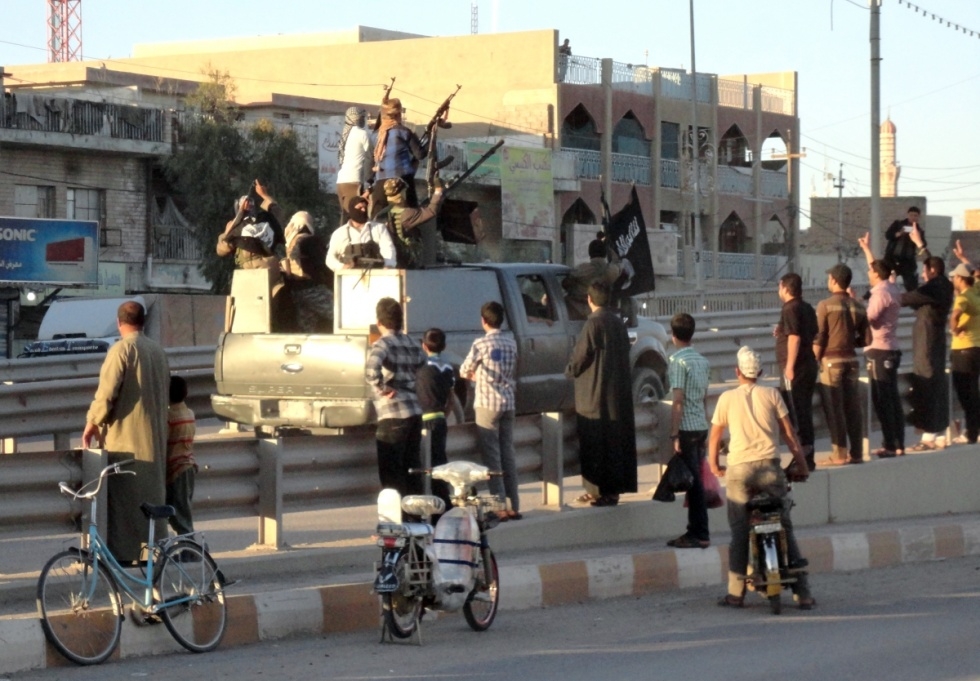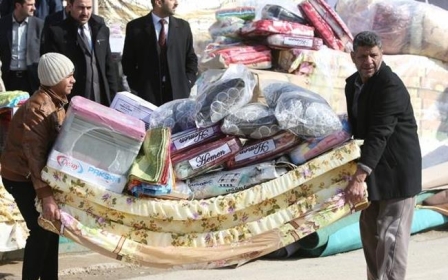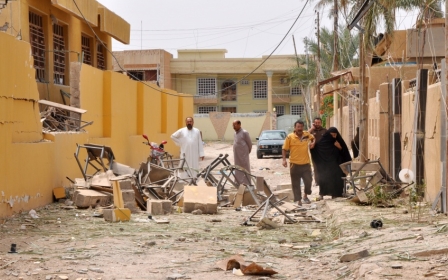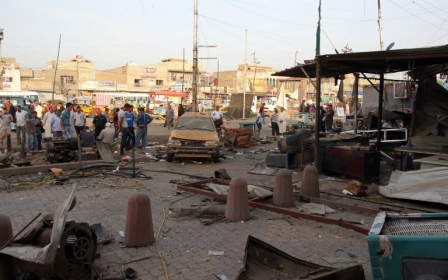Fallujah and Obama's proxies in Iraq

Fallujah and its residents deserve the Nobel Peace Prize. Their capacity to singlehandedly reconcile former enemies surpasses that of the most seasoned diplomats. Militants now work alongside US Special Forces, and US airstrikes give support to Iranian troops, whose dubious conception of human rights bypasses US qualms on the issue.
This is not a consequence of the much-celebrated Iran nuclear deal: Iran and the US have been working together for months, more openly since the Battle of Tikrit. On this occasion, the Iranian Revolutionary Guard of Major General Suleiman was supported by US airstrikes, without which the month-long siege inflicted on no more than 80 Islamic State (IS) fighters could have lasted much longer.
Since the beginning of hostilities against Fallujah on 28 December 2013, the Iraqi government and its allies have not stopped bombarding the city. Its civilian residents who could either not afford to leave, or had to return from exile because they were too poor to stay in safety in Iraqi Kurdistan, have been left to pay a heavy price: 3,190 have been killed and 5,197 wounded.
This is not the first time that Fallujah has been steadily destroyed, yet since the beginning of the Muslim holy month of Ramadan, the shelling of the city has become more intense. Fallujah is a symbol: it is the city that never surrenders, or only does when it is left to look like the Chechen town of Grosny in its prime. It might surrender again, but at what price? Dr. Ahmed Shami Jasim, chief resident at the Fallujah Teaching Hospital, confirmed that over the last month, 224 civilians have been killed, including 46 women and 55 children, and the numbers are growing daily.
Who is doing the killing? Fallujah is now surrounded from Saqlawiya to the west and Amiriyat al-Fallujah to the south by the Iraqi Popular Mobilisation Forces (PMF), known in Arabic as Hashed al-Shabi. Decried by some as a Shia militia exerting systematised revenge killings on Iraqi Sunnis, and glorified by others as the new Iraqi awakening, the PMF is headed by Abu Mahdi al-Muhandis, who is still on the US list of designated terrorists.
Muhandis has been maintaining close ties with the Iranian Quds Brigades and their chief General Qasem Suleiman, who was openly present during the Tikrit offensive. Despite the rumours that he has actively prepared the Anbar offensive, General Suleiman has been making himself very discreet, as the few Sunni tribes who joined the PMF as well as President Obama declared that they would not participate in the Anbar offensive should he be present.
Several Fallujah residents have communicated with the authors that Scud missiles were launched onto the city in the last two weeks. In the region, only two armed forces possess such offensive ballistic missiles: Syria and Iran. While it is impossible for now to corroborate this information with pictures, this would prove that the Iranian army is indeed involved in the Anbar offensive. Over a year ago, the launching of barrel bombs over Fallujah was disputed by the Iraqi government until media outlets and human rights organisations reported it and made it a fact. Could this be the case for Scud missiles too? This would prove the direct Iranian involvement in the Anbar offensive with weapons that are still prohibited in the new and trendy Iranian nuclear deal.
Muhandis is also being directly supported by the United States. West of Saqlawiya is Habanyia Airbase, where US Special Advisors were sent to train the PMF last January. While it is said that they only train Sunni tribes, Shia militias are also on the base. In effect, the US Special Advisors are training the troops of a wanted “terrorist”. From the same Habaniyah airbase and also the al-Asad base, Iraqi Army helicopters take off to drop their barrel bombs onto Fallujah. While some reports hint at the US and Iraqi militias mistrust one another, this does not make much of a difference for the Fallujah residents, who are still being bombarded, whether or not all parties to their destruction get along.
As the ground offensive against Fallujah is likely to occur after the Eid celebrations, Fallujah is not empty of civilians like Tikrit was when Iranian and Iraqi forces laid siege to it last march. It is reportedly filled with civilians whose IDs were confiscated by IS so that they could not leave the city. Should this be the case, and whether or not they are human shields, scores of civilians are likely to die in the crossfire. Should this happen, it would directly implicate the Obama administration, which is using the PMF, the Iraqi Army, and Iranian military presence on the ground as proxies. US troops are way too close to the human rights abuses not to be tarnished by them.
Many have said that President Obama does not have a clear strategy against IS. What is clear with the facts on Fallujah’s ground and the scores of civilians killed during Ramadan is that his strategy is to use proxies. So far, this has been an open secret that many would rather not see. It is much more palatable to celebrate a diplomatic deal with Iran than to see the reality for what it is. While many have decried the Bush administration’s outsourcing of torture through its rendition program, the same observers ought to see Obama’s Iraq strategy as working directly with proxies to spread terror against civilians. Iran, the Iraqi government and the PMF have become the Middle East Contras of the Obama administration.
- Dr Victoria Fontan is Interim Chair of the Politics and Public Policy Department, American University Duhok Kurdistan; she is also a Doctoral Candidate in War Studies at King’s College London. Ross Caputi is an American veteran of the occupation of Iraq. He is also on the Board of the Islah Reparations Project and he is a graduate student in English Studies at Fitchburg State University.
The views expressed in this article belong to the author and do not necessarily reflect the editorial policy of Middle East Eye.
Photo: File picture shows gunmen in the Iraqi city of Fallujah (AFP)
Middle East Eye propose une couverture et une analyse indépendantes et incomparables du Moyen-Orient, de l’Afrique du Nord et d’autres régions du monde. Pour en savoir plus sur la reprise de ce contenu et les frais qui s’appliquent, veuillez remplir ce formulaire [en anglais]. Pour en savoir plus sur MEE, cliquez ici [en anglais].





